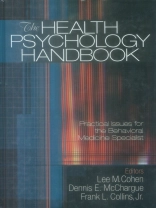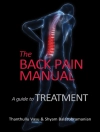‘It is sure to be an invaluable resource to scientist-practitioners during the education and training process as well as to those continuing their professional development . . . with this Handbook , we have a great resource to facilitate what is ready for translation from research to practice now. Our patients can benefit from these services now and we need a well-trained health care workforce to meet these needs.’
–From the Foreword by Cynthia D. Belar, Ph.D. ABPP
The Health Psychology Handbook: Practical Issues for the Behavioral Medicine Specialist is a comprehensive yet practical volume that consolidates information needed by health psychologists working alongside other healthcare professionals. It facilitates the progression of the learner from the classroom to the clinical setting by focusing on the translation of science to practice using concrete examples.
The Handbook is divided into four major parts. Part I highlights practical issues faced by health psychologists in a medical setting (how to motivate patients, consultation-liaison, assessment and screening, brief psychotherapies, ethical issues, etc.). Part II concentrates on treating unhealthy behaviors (alcohol and nicotine use, noncompliance, overeating/obesity, physical inactivity, stress). Part III considers behavioral aspects of medical problems (pain management, hypertension, diabetes, cancer, sexual dysfunction, HIV/AIDS, irritable bowel syndrome, insomnia). And Part IV takes up special issues relevant to practice and research in the field (minority issues, women′s issues, working with geriatric populations, public health approaches to health psychology and behavioral medicine).
Besides considering health problems, the handbook also discusses professional issues, such as:
- Working with a multidisciplinary staff
- Conducting research
- Evaluating outcomes
- Practicing in public health settings
The Handbook will prove an invaluable resource for those already working in the field of health psychology as well as for those in training.
‘The editors have developed an excellent sense of the needs of behavioral medicine practitioners . . . I found myself quite enthusiastic about the ability of the editors to conceptualize the problems of the practitioner and the ways to address them in this volume . . . The choice of authors is excellent.’
–William Lovallo, University of Oklahoma & VA Medical Center
‘A handbook like this is a very valuable resource . . . The clinical focus is what is special about the Handbook .’
–Lynn Kozlowski, Pennsylvania State University
Cuprins
Foreword – Cynthia D. Belar
PART ONE. PRACTICAL ISSUES FOR THE BEHAVIORAL MEDICINE SPECIALIST
Introduction – Lee M. Cohen, Dennis E. Mc Chargue, & Frank L. Collins
1. Health Psychology Practice in Medical Settings – Richard J. Seime, Matthew M. Clark, & Stephen P. Whiteside
2. Psychological Assessment Screening in Medical Settings – Michael D. Franzen
3. Working with a Multi-Disciplinary Staff – Helen R. Winefield & Anna Chur-Hansen
4. Motivational Enhancement Interventions & Health Behaviors – Thad R. Leffingwell
5. Brief Psychotherapies & Group Treatments in General Health Care Settings – Deborah J. Wiebe, Lindsey Bloor, & Timothy W. Smith
PART TWO. BEHAVIORS THAT COMPROMISE OVERALL HEALTH STATUS
Introduction – Lee M. Cohen, Dennis E. Mc Chargue, & Frank L. Collins
6. Alcohol Problems: Causes, Definitions, & Treatments – Joel Erblich & Mitch Earleywine
7. The Etiology & Treatment of Nicotine Dependence: A Biopsychosocial Perspective – Lee M. Cohen, Dennis E. Mc Chargue, Monica Cortez-Garland, Eric Prensky, & Sadie Emery
8. Obesity & Body Image Disturbance – Myles S. Faith & J. Kevin Thompson
9. Physical Inactivity as a Risk Factor for Chronic Disease – Krista A. Barbour, Timothy T. Houle, & Patricia M. Dubbert
10. Stress & Health – Frank L. Collins, Jr., Kristen H. Sorocco, Kimberly R. Haala, Brian I. Miller, & William R. Lovallo
11. Management of Inappropriate Medication-Seeking Behavior – Suzy Bird Gulliver, Barbara A. Wolfsdorf, & Alexander Michas
12. Adherence to Medical Recommendations – Nicole E. Berlant & Sheri D. Pruitt
PART THREE. BEHAVIORAL ASPECTS OF MEDICAL PROBLEMS
13. Diagnostic and Treatment Considerations in Chronic Pain – Jennifer L. Boothby, Melissa C. Kuhajda, & Beverly E. Thorn
14. Hypertension – Mustafa al′Absi & Richard G. Hoffman
15. Coronary Heart Disease: Behavioral Cardiology in Clinical Practice – Steven M. Schwartz & Mark W. Ketterer
16. Behavioral Management of Type2 Diabetes – Ahna L. Hoff, Janelle L. Wagner, Larry L. Mullins, & John M. Chaney
17. Psycho-oncology – Shulamith Kreitler
18. Sexual Dysfunction: Etiology & Treatment – Sheila Garos
19. Human Immunodeficiency Virus & Acquired Immune Deficiency Syndrome – Andrew C. Blalock & Peter E. Campos
20. Irritable Bowel Syndrome – Jeffrey M. Lackner
21. Insomnia & the Sleep Disorders – Valerie A. Wolfe & Sheri D. Pruitt
PART FOUR. SPECIAL ISSUES
Introduction – Lee M. Cohen, Dennis E. Mc Chargue, & Frank L. Collins
22. Ethical Issues for Clinicians in Behavioral Medicine Settings – Nicole J. Siegfried & Chebon A. Porter
23. Ethnocultural Issues in Behavioral Medicine – Hector F. Myers & Wei-Chin Hwang
24. Women′s Health Issues – Csilla T. Csoboth
25. Issues with Geriatric Populations – Barry A. Edelstein, Andrea K. Shreve-Neiger, Adam P. Spira, & Lesley P. Koven
26. Public Health Approaches: Finding the Interface with Health Psychology – Jalie A. Tucker, Joshua C. Klapow, & Cathy A. Simpson
27. Practical Research in Medical Setting is Good Medicine – Kathleen M. Palm, Jack L.-M. Mutnick, David O. Antonuccio, & Elizabeth V. Gifford
28. Evaluating Outcomes in Health Care Settings – Joaquin Borrego, Jr., & William C. Follette
Name Index
Subject Index
Despre autor
Dennis E. Mc Chargue holds a joint appointment at the University of Illinois-Chicago as a Research Assistant Professor and at the Edwards Hines Jr. VA Hospital as a Health Research Scientist. His research examines biobehavioral factors associated with treatment of smokers with co-morbid psychopathology. His research on the influence of negative moods on nicotine-dependent individuals with a history of depression is funded by the NIH and Department of Veterans Affairs. He conducted two years of postdoctoral training at U.I.-Chicago focusing on pharmacological and behavioral treatment of nicotine-dependent people with co-morbid depression. He also completed an internship at the Boston University/Boston VAMC Consortium on treatment of substance abuse patients with co-morbid PTSD.












